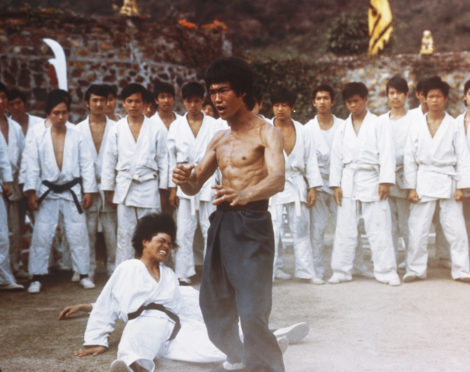
You’re moderating the Q&A at this year’s Kung Fu Film Festival. What made you interested in joining the panel?
I’m approaching it like an audience member – just someone who is interested in learning more about the genre. That being said, my dad often watched Police Story while I was growing up, and that’s the film that made me aware of Jackie Chan. I think everyone knows who Jackie Chan is even if they’ve never seen his movies, and that was definitely the case for me.
Do you think dubbing affects the cinema experience?
I don’t think dubbing hinders the enjoyment of the film, but I do think it has contributed to this reluctance among western audiences to read subtitles. There are some very good dubs – Disney’s dub of Howl’s Moving Castle comes to mind – but generally I think subbing retains certain cultural nuances that dubbing loses because it tends to make the dialogue more digestible for an English-speaking audience.
What did you think of Tarantino’s depiction of Lee in Once Upon a Time in Hollywood?
What struck me about Bruce Lee’s portrayal in Once Upon a Time in Hollywood is that the audience would laugh at him. Tarantino doesn’t treat him with the same reverence as he does with the other Hollywood icons depicted in the film, such as Sharon Tate and Steve McQueen. He’s only used as a prop to highlight the strength and brutality of his own fictional creation, Cliff Booth played by Brad Pitt. And when Bruce Lee is one of the few non-white characters in the film, that does raise alarm bells for me.
Has Keanu Reeves influenced the modern kung fu genre?
In certain aspects, I would say so. The Matrix is definitely inspired by kung fu cinema in its fighting scenes. But Keanu Reeves has always had a deep respect for kung fu that I don’t see him as a pioneer so much as he uses his star power to bring kung fu to the mainstream. You can see that in the film he directed, Man of Tai Chi, which features so many fighters using different styles. It’s an outlandish film but it really demonstrates how vast and multifaceted kung fu is.
Kung fu films were often banned due to their depiction of violence – do you think that’s interesting considering the comparatively graphic gore scenes we have today?
I think the fact that kung fu films were banned in the past speaks more to how desensitised audiences have become to violence now. If these films were released today, I’m certain they wouldn’t get banned because violence and gore have become the norm, and films like Enter the Dragon are tame compared to what’s showing in cinemas now. There was a decapitation in the last Avengers movie and no one said anything.
What’s your favourite kung fu film?
I love Drunken Master. Jackie Chan uses kung fu in such a creative and funny way, but it’s also still physically impressive. It’s reminiscent of Buster Keaton in a way – there is a slapstick element to it, but it’s also so extreme and elaborate that no one else would dare try it.
The Kung Fu Film Festival takes place from September 16 to 22 at Summerhall, Edinburgh. Visit summerhall.co.uk

Enjoy the convenience of having The Sunday Post delivered as a digital ePaper straight to your smartphone, tablet or computer.
Subscribe for only £5.49 a month and enjoy all the benefits of the printed paper as a digital replica.
Subscribe